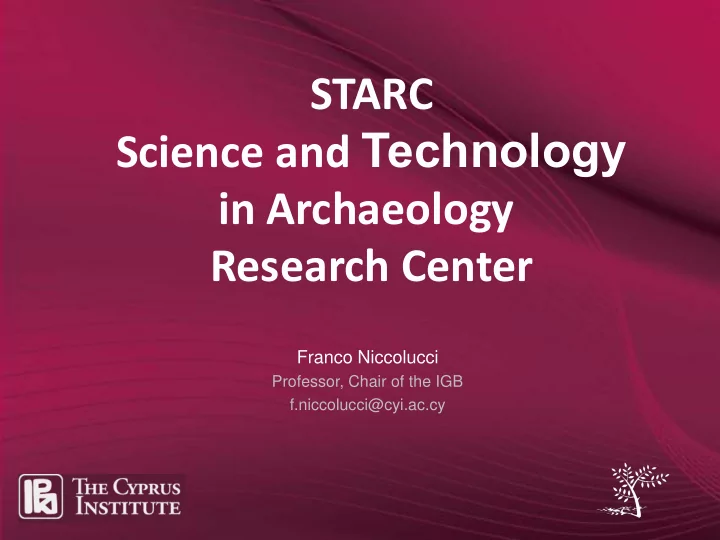

STARC Science and Technology in Archaeology Research Center Franco Niccolucci Professor, Chair of the IGB f.niccolucci@cyi.ac.cy
The Cyprus Institute The Cyprus Institute (2005) is an not-for-profit, independent educational and research institution based on interdisciplinarity and an issue-based approach to research (as opposed to the traditional, academic discipline-based one). At the Cyprus Institute, activity is organized in Research Centers: • Energy, Environment and Water - EEWRC • Science and Technology in Archaeology - STARC • Computation-based Science and Technology - CASTORC
History of STARC 2004Center included in the original design of The Cyprus Institute under the name of Center for Technology in Archaeology and Cultural Heritage . Remit: “[to] research, develop, adopt and employ the use of modern scientific and technological techniques and novel technologies in the field of archaeology (excavations, surveys, evaluation of archaeological data) and in the preservation and presentation of cultural heritage (museums, libraries, archaeological sites etc.).” 2007MoU with the Municipalities of Paphos and Geroskipou : provision of facilities and support Underwater archaeology added 2007MoU with C2RMF: assistance and guidance in Center development 2008Research activities started EU funding secured: 4 projects as partner - 2 projects as Coordinator One national project secured Several research projects on-going, planned or ready to start
Facilities CyI Guy Ourisson Building (now) Location of definitive facilities (2012?) 1000 m 2 offices - 2500 m 2 laboratories CyI-STARC Pafos Headquarters (2010)
Fields of activity The scientific themes on STARC research agenda relate to the basic mission of the Center, and currently are: Material and Natural Sciences Applications • Archaeological Sciences Archaeometallurgy, Bioarchaeology Digital Heritage • Heritage Documentation and Semantics Archaeological records, Data acquisition (2D-3D) and management Standards and digital libraries • Visualization and Heritage Communication Underwater and Maritime Archaeology Technology Diagnostic Analyses for Conservation and Preservation Geographical focus: Cyprus and the Eastern Mediterranean basin Staff of 13 researchers
Research activities Funded projects • EU • National • Private Self-funded and co-funded projects Outreach initiatives
EU Projects Digital libraries • EDLocal : standards for digital content (2008-2010) • ATHENA : standards for digitizing museum collections (2008-2010) • CARARE : digital content from archaeological investigations (2010-2012) Research infrastructure • STACHEM : survey of research infrastructures on archaeological sciences, digital heritage and underwater archaeology in the Eastern Mediterranean (2008-2010) Marie-Curie grant • TIEM : IT-enabled survey of Medieval Architecture in Cyprus and the Aegean Islands in the light of contemporary written sources (2009-2013) Integrated Project on 3D visualization for CH • 3D-COFORM : collections of 3D digital replicas of cultural objects (2008- 2012)
STACHEM Surveying and analyzing the research infrastructures of the Eastern Mediterranean basin in the fields of digital heritage, archaeological sciences and underwater archaeology. Will produce reports on • Users’ needs • Existing infrastructure • Forthcoming research opportunities Results due Summer 2010
Research in Archaeological Sciences Larnaca painted sarcophagi (with C2RMF and DoA) Others planned to start in 2010 • Archaeometallurgy • Polychromy • Human bio-archaeology • Underwater archaeology Creation of a mobile Laboratory • National project STAR-LAB • 4-wheel drive truck • Cabin equipped with portable instruments Non-destructive analysis 3D and 2D data capture Geophysics
Research in Digital Heritage 3D data acquisition and surveys • Paphos theatre • Hala Sultan Tekke • Museum artifacts Digital libraries • Content provision to Europeana Heritage data management • Museum collections • Excavation data
Focus of Archaeological Sciences Materials sciences and artefact studies: ceramics, metallurgy, glass and vitreous materials. Provenance studies, residue analysis Bioarchaeology (analyses of any biological remains recovered from archaeological sites): human bioarchaeology, zooarchaeology, human and animal palaeopathology Technologies for non-invasive artefact analysis (also aimed at conservation) and related equipment, such as XRF, NRF, CT
Focus of DH research Semantics and ontologies for 3D cultural objects, from excavation data and museum artefacts to historic complexes and landscape • Integrated records management for excavation data • Museum documentation • 3D data documentation (sites, museum artifacts) 3D visualization • For scientific purposes • For communication
For more information Web site: http://starc.cyi.ac.cy f.niccolucci@cyi.ac.cy
Recommend
More recommend